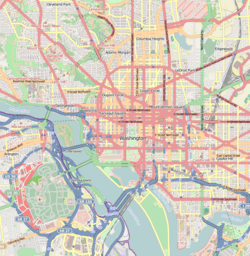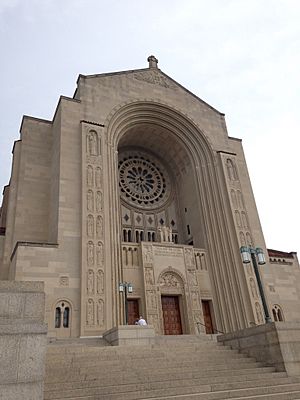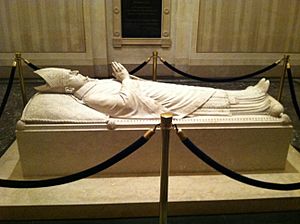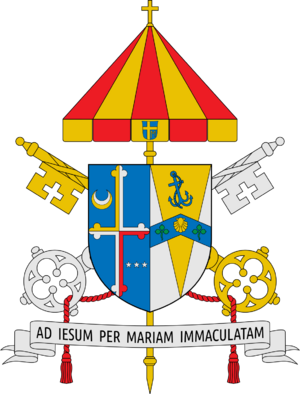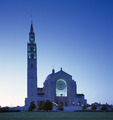Basilica of the National Shrine of the Immaculate Conception facts for kids
Quick facts for kids Basilica of the National Shrine of the Immaculate Conception |
|
|---|---|
| National and Patronal Church of the United States of America |
|
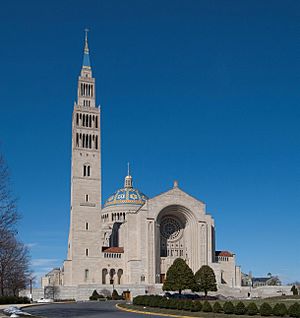
View from south in 2010
|
|
| 38°56′0″N 77°0′02″W / 38.93333°N 77.00056°W | |
| Location | Washington, D.C., U.S. |
| Country | United States |
| Denomination | Catholic Church |
| Tradition | Roman Rite, various Eastern Catholic liturgies |
| History | |
| Status |
|
| Dedication | Immaculate Conception |
| Dedicated | November 20, 1959 |
| Consecrated | September 23, 1920 |
| Architecture | |
| Architect(s) | Maginnis & Walsh |
| Architectural type | Basilica |
| Style | Byzantine Revival and Romanesque Revival |
| Groundbreaking | May 16, 1920 |
| Completed | December 8, 2017 |
| Specifications | |
| Capacity | 3,500 |
| Length | 459 feet (140 m) |
| Width | 240 feet (73 m) |
| Nave width | 157 feet (48 m) |
| Height | 329 feet (100 m) |
| Dome height (outer) | 237 feet (72 m) |
| Dome height (inner) | 159 feet (48 m) |
| Dome diameter (outer) | 108 feet (33 m) |
| Dome diameter (inner) | 89 feet (27 m) |
| Administration | |
| Archdiocese | Archdiocese of Washington |
The Basilica of the National Shrine of the Immaculate Conception is a very important Catholic building in Washington D.C.. It is a minor basilica and a national shrine. This means it's a special church with a high honor from the Pope, and it's a place where many people go on religious trips.
It is the largest Catholic church in North America. It is also the tallest building in Washington, D.C., that people can live or work in. The church's unique style mixes Byzantine and Romanesque Revival designs. Its construction started on September 23, 1920.
The basilica is dedicated to the Blessed Virgin Mary under the title of the Immaculate Conception. This title means Mary was born without sin. She was chosen as the main patroness (a special protector) of the United States by Pope Pius IX in 1847. In 1923, Pope Pius XI even gave a beautiful mosaic picture of the Immaculate Conception to the church.
On October 12, 1990, Pope John Paul II officially made the National Shrine a Minor Basilica. Later, Pope Benedict XVI visited the shrine on April 26, 2008, and gave it a special gift called a Golden Rose. On September 23, 2015, Pope Francis also visited and declared Junípero Serra a saint there.
Contents
About the Basilica's Location
The basilica is located in Washington, D.C., near the Catholic University of America. The university actually donated the land for the church to be built. Even though it's in the area of the Roman Catholic Archdiocese of Washington, it's not a regular parish church. This means it doesn't have its own local community like most churches.
Instead, it serves the Catholic University and the United States Conference of Catholic Bishops. Many different Catholic groups from all over the U.S. hold their special Masses and events here. The main church for the Archdiocese of Washington is the Cathedral of St. Matthew the Apostle. However, many important events for the archdiocese also happen at the basilica.
You can easily get to the basilica by public transport. The Brookland–CUA station on the Red Line of the Washington Metro is about 500 meters (about 550 yards) away.
Amazing Architecture and Art
The basilica is truly huge and beautiful inside. It has 82 chapels dedicated to Mary, the mother of Jesus. These chapels are found along the sides of the Great Upper Church and the Crypt Church. Each chapel was designed to honor the different backgrounds of Catholic Americans and the religious groups who helped build them.
The inside of the church has a Greek-inspired design. It features many domes covered in stunning mosaics. These mosaics are similar to those found in the famous Basilica of St. Mark in Venice, Italy, but they are even bigger. The art in the mosaics shows traditional Catholic images with an American touch. A famous artist named Jan Henryk De Rosen helped create much of the art, including a large mosaic over the northern part of the church.
The outside of the basilica is 459 feet (140 meters) long and 240 feet (73 meters) wide. The highest point, the top of the cross on the main dome, is 237 feet (72 meters) tall. The main dome, called the Trinity Dome, is only 7 feet (2.1 meters) shorter than the dome of the U.S. Capitol Building.
The Trinity Dome is covered with 47,000 shiny roof tiles. These tiles are arranged to create patterns from the biblical stories. Blue tiles represent the Virgin Mary, yellow tiles are like those found in ancient churches, red tiles stand for Christ's blood, and grey tiles are used to make the patterns stand out.
The shrine was built like medieval churches, using thick stone walls and columns instead of modern steel. It was designed to hold 10,000 people for worship. It also has modern features like a cafeteria in the basement. It even has hidden speakers to help everyone hear the services and air conditioning. In 1959, it had the largest radiant heating system in the world.
Inside the Crypt Church, you can see arches decorated with colorful tiles. There are also large ceramic art pieces on the ceiling. You can also find the fourteen Stations of the Cross, which show important moments from Jesus's final journey.
History of the Basilica
Choosing the Patroness
In 1792, John Carroll, who was the first Catholic bishop in the United States, placed the new country under the special protection of the Blessed Virgin Mary. He chose her title of the Immaculate Conception. In 1846, Catholic leaders in Baltimore confirmed this choice. Then, Pope Pius IX officially approved this decision on February 7, 1847.
Building the Church (1900s)
Bishop Thomas Joseph Shahan had a big idea. He was the head of the Catholic University of America in Washington, D.C. He suggested building a national shrine to honor the Immaculate Conception in the nation's capital. Bishop Shahan shared his idea with Pope Pius X on August 15, 1913.
The Pope loved the idea and even gave $400 of his own money to start the project. Bishop Shahan returned to the U.S. and convinced the Catholic University to donate land for the shrine.
In January 1914, Shahan started a newsletter called Salve Regina. He wanted to get people excited about building the shrine. He wrote that it would be a "monument of love and gratitude." People across the country started sending money to help. In 1915, Father Bernard McKenna became the first director of the national shrine. Bishop Shahan worked on the shrine until he passed away on March 9, 1932. He is the only person buried at the basilica.
By 1919, Shahan and McKenna chose the design for the shrine. They picked a design that mixed Byzantine and Romanesque styles. On May 16, 1920, a special Mass was held to bless the building site. On September 23, 1920, Cardinal James Gibbons blessed the first foundation stone. Over 10,000 people attended, including important government and military leaders.
The first public Mass inside the shrine was held in the unfinished Crypt Church on April 20, 1924. However, building stopped in 1932 because Bishop Shahan died and the Great Depression hit. World War II caused more delays. Construction didn't start again until 1954.
After the war, in 1953, Catholic bishops in America decided to raise money to finish the Great Upper Church. Work began again on November 15, 1954. On November 20, 1959, thousands of Catholics gathered to celebrate the dedication of the Great Upper Church.
Since 1968, the Papal Tiara of Pope Paul VI has been on display inside the Crypt Church. On October 12, 1990, Pope John Paul II officially made the national shrine a minor basilica. It was the 36th church in the United States to receive this special title.
Finishing Touches (2000s)
In August 2006, a beautiful mosaic was finished on the Redemption Dome in the Great Upper Church. Another dome, the Incarnation Dome, was blessed in November 2007 after its completion. A small chapel honoring Our Lady of La Vang (from Vietnam) was also finished in 2006.
In 2008, during his visit to the United States, Pope Benedict XVI gave the Basilica of the National Shrine of the Immaculate Conception a special Golden Rose.
In June 2011, a new chapel dedicated to Our Lady of Lebanon was built inside the basilica. This chapel honors the Maronite Church and its followers. It includes a mosaic of Saint Maroun and the Crucifixion, copied from an old manuscript.
On January 26, 2013, the basilica held a special Mass. During this Mass, two important items (called relics) of American saints, Kateri Tekakwitha and Marianne Cope, were placed in the church. They had both become saints in October 2012.
Pope Francis visited the shrine on September 23, 2015. He celebrated a Mass to declare Saint Junípero Serra a saint. The altar, reading stand, and chair used for this Mass now match the marble in the basilica. The papal altar is now used as the main altar in the Great Upper Church.
The very last part of the basilica's architecture was completed in December 2017. This was the installation of 24 tons of Venetian glass in the central Trinity Dome. This is one of the largest mosaics of its kind in the world. On December 8, 2017, the dome was officially dedicated and blessed.
Images for kids
-
The basilica viewed from atop the Washington Monument
-
Relief sculpture of Saint Margaret of Scotland
-
The papal tiara of Pope Paul VI
See also
 In Spanish: Basílica del Santuario Nacional de la Inmaculada Concepción para niños
In Spanish: Basílica del Santuario Nacional de la Inmaculada Concepción para niños
- Top Catholic pilgrimage destinations in the United States
- List of basilicas
- List of Catholic cathedrals in the United States
- Architecture of Washington, D.C.
 | Claudette Colvin |
 | Myrlie Evers-Williams |
 | Alberta Odell Jones |


